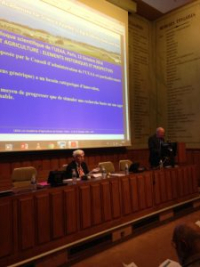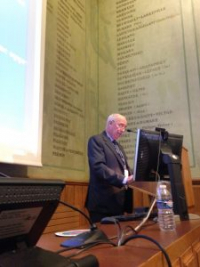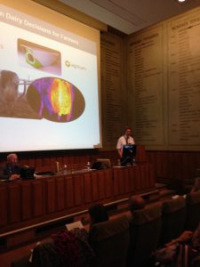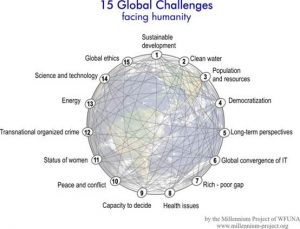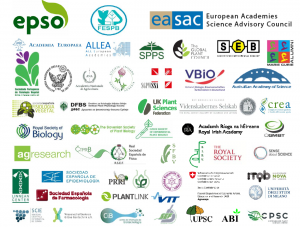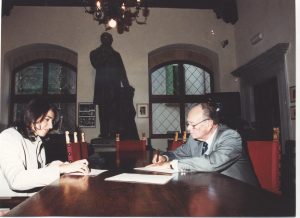
WELCOME ADDRESS by Professor Michel Thibier
 The Abstract Book of the Colloquium (PDF, 540 kB)
The Abstract Book of the Colloquium (PDF, 540 kB)- Report on the Post conference Tour in the Champagne region (France) – 13 October 2016 – by D E Marchand (Member of the AAF) (DOCX, 540 Kb)
(Also see the slides of all presentations here below, after the welcome address)
Dear Colleagues,
It is my privilege and honor to welcome you all here in Paris for this 2016 UEAA Colloquium and in particular to this very building of the Académie d’Agriculture de France.
The French Academy of Agriculture is a direct descendant of the Agricultural Society of the Generalitat de Paris, which was founded on the 1st of March 1761, by King Louis XV, and after the report of the famous Controleur Général Bertin.
Since its birth in 1761, several famous personalities, among them the most eminent in the field of agronomy (Duhamel de Monceau, Buffon, Lavoisier, Malesherbes, Vilmorin etc…..) have contributed to its high reputation, at first in Europe and later worldwide. It is worth noting that it emerged right in the middle of the “Siècle des Lumières”, at the height of the “Enlightenment”, when it became essential to develop agriculture in European countries, using and improving the techniques available.
The task given to the Academy by the King of France was to create a survey of the agronomic ideas of the time, which could then be discussed at its weekly meetings. The techniques validated through this process were then disseminated, first to his Council, then across the whole country, to promote the modernization of agriculture. Science was already in the “game”, as will be discussed later in this Colloquium.
The UEAA – in English: the Union of European Academies for Science Applied to Agriculture, Food and Nature is not quite as old….
It was founded in Bologna, Italy, in 1999. In October 2000, the first General Assembly (GA), held in Florence, Italy, enacted the union’s bylaws. 14 European academies were members in the beginning, not all of them members of the EU. Italy’s academy held the first presidency, with France as Vice-president. Its ninth General Assembly was held yesterday under the Presidency of France, with the Vice Presidency going back to Italy, 17 years after the birth of the Union.
The 8th G A of the UEAA in Prague proposed the following topic for this 9th GA in Paris:
“Science in Agriculture: historical perspectives and prospective insights”.
This topic was felt to be so relevant to current concerns that the French group proposed to the steering committee that it should hold a Colloquium on its own to allow more time for discussion on this prominent issue: Science and Agriculture”.
The overall idea was to make the claim that:
- Agriculture, as a generic subject including all disciplines under its umbrella (animal production, forestry etc..), needs innovation more than ever, for many reasons, but in particular in relation to the extraordinary increase of the human population on our beloved planet,
- The only way to progress is to stimulate sound science-based research and development,
so as to put “science” in the heart of innovation in Agriculture in our contemporary world.
So how can the Academies of Agriculture or related bodies demonstrate to Society as a whole that there is no alternative to meeting the considerable challenges in:
- Feeding a world population that will soon be 9 billion people,
- respecting the whole environment of humankind
- and ensuring that the people involved in producing food – farmers and breeders, wherever they are in the world – can make a decent living out of doing so.
How can this be done?
A European Union of these Academies is a move in the right direction. “ L’Union fait la force” as our Belgian colleagues say: ‘Unity is Strength’. The fact that they include distinguished scientists and practitioners is also important. But what is really needed now is to communicate more effectively on this critical point: the need to put Science at the heart of innovation in Agriculture.
The Colloquium that we are holding today is one way to testify to the considerable power of sound science to produce progress, and hence to increase the probability of meeting the challenges of the 21st century. “Science in Agriculture: historical perspectives and prospective insights”.
This Colloquium was organised by the scientific committee under three headings:
- to establish the intrinsic link between Agriculture and science in the past, at present, and hopefully, but certainly necessarily, in the future
- to report on the various disciplines involved in this very necessary process of innovation: agronomy, animal breeding, forestry, ecology, sociology, economics etc..
- and to show that this intimate link between science and agriculture is a reality, whatever the local climatologic, pedologic etc. . patterns may be, across the whole of Europe, from Scandinavia to the Mediterranean Sea and from the Atlantic Ocean to the Ural Mountains.
- So to translate those ideas into practice, this Colloquium will be divided in three sessions:
- the first will begin with some historical perspectives thanks to our “agrarian historian colleagues”, followed by some current perspectives on the impact of climatic change, and finally to the EU Commission’s plans for research and innovation in the next few years.
- the second session will be devoted to present and future challenges for land and soil management, with some practical applications in one case study, that of Latvia in the Baltic area.
- The third will also include a case study, from Romania, and will then be more oriented to the future, with reference to biotechnology and genomics research for sustainable innovation in agriculture. We shall end with an interesting reflection on the way the younger generation envisages agriculture in the future,
The scientific committee of this Colloquium hopes these sessions will be of the greatest interest, and thanks all attendees for being here today, in this historical lecture room of the Académie d’Agriculture de France.
Thank you
The slides of all presentations
 European Agricultural Societies, 1750-1900: experimenting and disseminating scientific progress, Nadine VIVIER (PDF, 1 MB)
European Agricultural Societies, 1750-1900: experimenting and disseminating scientific progress, Nadine VIVIER (PDF, 1 MB) The impact of agricultural science 1850 – 2016 : from a gentleman’s amusement to the saviour of the world ? Paul BRASSLEY, University of Exeter, UK (PDF, 256 kB)
The impact of agricultural science 1850 – 2016 : from a gentleman’s amusement to the saviour of the world ? Paul BRASSLEY, University of Exeter, UK (PDF, 256 kB) Climate change and Agriculture Giampiero MARACCHI, Academy of Georgofili (PDF, 3 MB)
Climate change and Agriculture Giampiero MARACCHI, Academy of Georgofili (PDF, 3 MB) Coping with the challenges of sustainable agriculture and food security – the contribution of EU research and innovation Marc DUPONCEL, DG Agriculture and Rural Development European Commission (PDF, 4 MB)
Coping with the challenges of sustainable agriculture and food security – the contribution of EU research and innovation Marc DUPONCEL, DG Agriculture and Rural Development European Commission (PDF, 4 MB) Territorial management of natural resources : Challenges for the Anthropocene Denis COUVET (PDF, 815 kB)
Territorial management of natural resources : Challenges for the Anthropocene Denis COUVET (PDF, 815 kB) Providing knowledge toward an improved biota supported soil management, a timely challenge Jean Charles MUNCH, Rainer MATYSSEK (PDF, 6 MB)
Providing knowledge toward an improved biota supported soil management, a timely challenge Jean Charles MUNCH, Rainer MATYSSEK (PDF, 6 MB) Outcomes and benefits of scientific research on development in latvian agriculture Baiba RIVZA (PDF, 6 MB)
Outcomes and benefits of scientific research on development in latvian agriculture Baiba RIVZA (PDF, 6 MB) Biotechnology: solutions for our alimentation Agnès RICROCH, Louis-Marie HOUDEBINE (PDF, 1 MB)
Biotechnology: solutions for our alimentation Agnès RICROCH, Louis-Marie HOUDEBINE (PDF, 1 MB) The impact of the research results on the romanian agriculture Gheorghe SIN, President of the Academy of Agricultural and Forestry Sciences ”Gheorghe Ionescu-Sisesti” (PDF, 6 MB)
The impact of the research results on the romanian agriculture Gheorghe SIN, President of the Academy of Agricultural and Forestry Sciences ”Gheorghe Ionescu-Sisesti” (PDF, 6 MB) Genomics and resilience Jean-Paul RENARD (PDF, 4 MB)
Genomics and resilience Jean-Paul RENARD (PDF, 4 MB) Future agriculture :in the minds of the next generation Lisa SENNERBY FORSSE (PDF, 4 MB)
Future agriculture :in the minds of the next generation Lisa SENNERBY FORSSE (PDF, 4 MB)
Commemoration of 250th anniversary of the Academy of Agriculture of France European symposium
Which future for agronomic research in Europe?
Since its inception, the French Academy of Agriculture (AAF) has kept in touch with similar academies in Europe. As a matter of fact, most of the latter were founded also at the end of the 18th century, the age of “Enlightenment”. It was a time of confidence in Science, the elite wishing it to play a central role in Society.
Two hundred and fifty years later, the confidence in Science has weakened. Agriculture and food sciences are affected all the same. Yet, we must continue to develop new techniques to overcome the tremendous problems posed by depleting natural resources and a growing world population. For that, we need research. To be fruitful, research must be free. At the same time, it must be supervised to avoid hasty application of unsecured findings, as well as to make the best use of scarce resources.
Agronomic research faces these difficulties and challenges all over Europe. This is the reason why the AAF has seized the opportunity of its 250th anniversary for inviting sister European academies to discuss the matter in this Symposium held under the aegis of the Union of European Academies of Agriculture (UEAA).
Prof. O. Christen (President, German Dachverbands Agrarforshcung): Agriculture research between tradition and new challenges
As the acting president of the umbrella association of all German scientific agricultural societies, which in total have a membership of more than 20.000 colleagues, I would like to congratulate the Academy of Agriculture of France sincerely to this outstanding anniversary.
Dr. P. Sylwan (Royal Swedish Acad. of Agriculture and Forestry) “Return to Eden: the role of Science in creating a sustainable agriculture for the future”
Facing the future. The challenges that has to be faced in future food production are enormous. In 2050 we will be another 3 billion humans on the Earth – our common home in space. Then we will need 50 – 100% more available food to affordable prices – in less than 40 years !
Prof. B. Rivza, Dr., Ieva Brence (Latvian Academy of Agricultural and Forestry Sciences) “Unanswered questions by reserch in the field of food safety and quality”
Food maintains being one of the most necessary factors in our lives. Regardless the fact on whether the live in order to eat or eat in order to live, food shall be used daily by each member of society. Research on food issues develops in interaction with overall science development, nevertheless, there are number of questions that remain important in scientific research, inter alia food safety and quality that involve many subordinated themes, e.g. scarcity of food and water resources in several regions….
Prof. Mariusz K. Piskula (Polish Academy of Sciences) “Agricultural Biodeiversity for Consumer Needs”
The perspective from which we look at and how we understand the relation between agrobiodiversity vs. nutrition and health depends on where….
Ivan Ushachev (Vice-President of the Russian Academy of Agricultural Sciences) “NATIONAL AND GLOBAL FOOD SECURITY: STATUS AND PROBLEMS”
Mgr. Jan Lipavský, CSc., Ing. Václav Hrubý, CSc. (Czech Academy of Agricultural Sciences, Prague) “FINANCING OF AGRICULTURAL SCIENCE AND RESEARCH”
Dr. M. Simula (Finnish Academy of Science and Letters) “Challenges facing European forestry research”
“Au nom de l’Académie des sciences et des lettres de Finlande, j’aimerais tout d’abord, féliciter l’Académie d’Agriculture de France à l’occasion de son 250ème anniversaire, et comme je suis le seul intervenant du secteur forestier de cette table ronde, je voudrais également souligner la grande valeur de la recherche française en matière de gestion durable des forêts tempérées et tropicales.”
Prof. B. Gaina (Moldavian Academy of sciences): “International cooperation and impacts of results on agricultural development in Moldavia”
Prof. F. Scaramuzzi (Italian Accademia dei georgofili): “National and global food security, quality and safety”
Prof. G. Sin (President, Romanian Academy of Agricultural and Forest Sciences Gheorge Ionescu-Sisesti): “Synergies and potential conflicts between food, fodder fibers and fuels”
10/01/2016
Thursday 18 Sep 2014, Slezská 7, Prague 2
UEAA Plenary meeting
9:00 – 9:15 Prof Ing Vilém Podrázský, CSc , president of the CAAS and vice-president of the UEAA, commenced the plenary meeting and welcomed participants and honoured guests. He informed those present of small changes in the programme that had been proposed at the previous session of the Steering Committee. During point 3 of the plenary session, Magnus J. Stark (KSLA) will provide information about the new UEAA website. During point 7, elections to the new Steering Committee for the next two years will take place.
26.05.2010
VI General Assembly and the International Conference “Scientific – Methodical Assuring Systems of the Safety and Quality of Food” (Ukraine, Odessa) 26 – 28 May 2010
Download pdf document “Invitation”
Download doc document “Application for participation”
05.01.2008
The fifth UEAA General Assembly
New elected President: Acad. Baiba RIVZA, President of the Academy of Agriculture and Forestry Sciences Latvia
Account of UEAA Steering Committee and General Assembly Meetings, Riga, Latvia, 28-30 May 2008
According to the constitution and the decisions made during the Yalta meeting in 16-17 May 2007, the 5th General Assembly of the Union of European Academies for Science applied to Agriculture, Food and Nature and associated Workshop on “Renewable Energy Resources, Production and Technologies”, were hosted by the Latvia Academy of Agriculture and Forestry Sciences Read more ….
Renewable Energy Resources, Production and Technologies – SCIENTIFIC PLENNARY SESSION
Renewable Energy Resources, Production and Technologies – POSTER PRESENTATIONS
06.01.2006
The fourth UEAA General Assambly
New elected President: Acad. Cristian HERA, President of the Romanian Academy of Agricultural and Forestry Sciences (AAFS)
According to the constitution and the decisions made during the Moscow and St. Petersburg meetings on 24-25 June 2004, as well as the Steering Committee meeting in Paris, October 11th 2005, the 4th General Assembly of the Union of European Academies for Science applied to Agriculture, Food and Nature and the associated Workshop on “Soil Fertility and the Future of Agriculture in Europe”, were hosted by the Romanian Academy of Agricultural and Forestry Sciences “Gheorghe Ionescu-Sisesti”. The events included the UEAA Steering Committee meeting on June 25, the Scientific Plenary Session and UEAA General Assembly on June 26, as well as the visit to the National Research and Development Agricultural Institute, Fundulea, on June 27. Read more ….
Soil fertility and the future of agriculture in Europe – SCIENTIFIC PLENARY SESSION
Soil fertility and the future of agriculture in Europe – POSTER PRESENTATION
THE PROGRAMME OF THE 4th UEAA MEETING and THE INTERNATIONAL WORKSHOP on SOIL FERTILITY AND THE FUTURE OF AGRICULTURE IN EUROPE
24.06.2004
The third UEAA General Assambly associated with the 75th anniversary of the Russian Academy of Agriculture (RAAS)
New elected UEAA President: Acad. Ghennady ROMANENKO, President of RAAS
PROGRAMME
SESSION OF GENERAL ASSEMBLY OF THE UNION OF EUROPEAN ACADEMIES FOR SCIENCES APPLIED TO AGRICULTURE, FOOD AND NATURE AND RUSSIAN ACADEMY OF AGRICULTURAL SCIENCES ON THE PROBLEM “GENETIC RESOURCES AND BIOTECHNOLOGY”
24-25 JUNE 2004
MOSCOW – ST. PETERSBURG
24 June, Thursday, 9.30 a.m.
Plenary session of the General Assembly of the Union of European Academies for Science applied to Agriculture, Food and Nature and the Russian Academy of Agricultural Sciences.
The House of Science of the Russian Academy of Agricultural Sciences
G. Romanenko – President of the Russian Academy of Agricultural Sciences.
- J.-M. Boussard – President of the Union of European Academies for Sciences applied to Agriculture, Food and Nature.
- Ecological and genetic bases for the forming of crop adaptive potential.
A. Juchenko – Vice-president of the Russian Academy of Agricultural Sciences. - The global dimension of science and technology for agriculture : needs, chances and risks for sustainability and poverty reduction.
J. Von Braun, director of International Food Policy Research Institute. - Genetic resources of farm animals in Russia.
V. Fisinin – First vice-president of the Russian Academy of Agricultural Sciences. - The creation and prospects of use of genetically modified farm animals, which are the producers of pharmacological proteins.
G. Brem – Professor of Munchen University (Germany). - Food biotechnology and food safety.
I. Rogov – Rector of Moscow state university of food biotechnology. - ERA-neetwork on Plant Genomics.
Willem Stiekema – Director of the Center for Biosystems Genomics of Wageningen University and Research Center. - Genetic resources of microorganisms and agricultural systems.
I. Tikhonovich – Director of All-Russian Research Institute of Agricultural Microbiology.
DISCUSSIONS
25 June, Friday, 11.00 a.m.
Round table A “Genetic resources and biotechnology in plant growing”, St. Petersburg, Vavilov Research Institute of Plant Growing
The chairmen of the round table : A. Juchenko, A. Atanasov (Bulgaria), V. Dragavtsev
- Genetic resources of plants and the ways of food increasing on the Earth.
V. Dragavtsev – director of Vavilov All-Russian Research Institute of Plant Growing. - A. Atanasov – director of AgroBioInstitute (Bulgaria).
- Introduction and selective breeding of vegetables with high content of biologically active compounds and antioxidants.
V. Pivovarov – director of All-Russian Research Institute of Selection and Seed Growing of Vegetables. - M.V. Montagu – the head of the Laboratory of Genetics, University of Ghent (Belgium).
- Genetic resources of seed-fruit plants and their use in selective breeding.
N. Savelyev – director of Michurin All-Russian Research Institute of Genetics and Selection of Fruit Plants. - G. Khush (India) – Visiting Scientist, University of California, USA.
- Medecine plants and phytocompounds : the present and the future.
V. Bykov – director of All-Russian Research Institute of Medicine and Aromatic Plants. - P. Gresshoff (USA) – director of ARC Center of Excellence for Integrative Legume Research, University of Queensland, Australia.
Round table “Genetic resources and biotechnology in animal breeding”, St. Petersburg, All-Russian Institut of animal genetics and breeding
The chairmen of the round table : L. Ernst, G. Brem (Germany), P. Prokhorenko
- Genetic resources of cattle.
P. Prokhorenko – director of All-Russian Research Institute of Genetics and Breeding of Agricultural Animals. - Genetic development of broilers in the XXI century.
J.McAdam – Associate Director of Ross Breeders Ltd. (U.K.). - M. Zubets – President of Ukrainian Academy of Agrarian Sciences (Ukraine).
- Genetic resources of horses.
V. Kalashnikov – director of All-Russian Research Institute of Horse Breeding. - Contemporary animal breeding in the Netherlands : theory and practice.
J.H. Metz – the dean of Wageningen University of Agrotechnology and Food Sciences. - Genetic ressources of fish.
A. Bagrov – director of All Russian Research Institute of Pond Fish Husbandry. - J. Bulla – dean of Faculty of Biotechnology and Food Industry, Slovak University of Agriculture (Slovakia).
- Genome analysis and gene-diagnostics in evaluation of genetic resources and breeding of agricultural animals.
N. Zinovyeva – head of Laboratory of Biotechnology, All-Russian Research Institute of Animal Breeding.
Round table “Genetic resources and biotechnology in microbiology and food industry”
The chairmen of the round table : E. Sizenko, A. Legocki (Poland), I. Tikhonovich
- Some peculiarities in biotechnological improvement for food products of the new generation.
V. Kharitonov – director of All-Russian Research Institute of Milk Industry. - G. Mencinicopschi – director of the Institute of Food Research (Rumania).
- Scientific-technical support of enzyme compounds biotechnology for processing industry of agricultural industrial complex.
V. Polyakov – director of All-Russian Research Institute of Food Biotechnology. - G. Eresco – director of Technological Institute of Milk and Meat (Ukrain).
- Current situation and prospects for the development of biotechnology in food additives production.
T. Nikiforova – director of All-Russian Research Institute of Food Aromatizers, Acids and Colors. - Science and technology in wine-making.
G. Epin – president and director general of “OENEO” (France). - Promising biotechnological complexes in meat industry.
A. Lisitsin – director of Gorbatov All-Russian Research Institute of Meat Industry. - Regulation of biotechnological processes in the production of sparkling wine and champagne.
B. Reitblat – director of RTA Technical Assistance GmbH (Germany). - Contemporary aspects of increasing food and biological value of drinks.
L. Oganesyants – director of All-Russian Research Institute of Brewing, Nonalcoholic and Wine-making Industries.
18.10.2002
New elected UEAA President: Prof. Jean-Marc BOUSSARD, President of the French Academy of Agriculture
Friday October 18th, 2002
Special session
(At the occasion of the general assembly of the Union of European Academies of Agriculture)
Reconciling Science, Public and Agriculture
Agenda
14:30: Introduction, by Jean-Marc Boussard, fellow of the Academy
14:45: A sociological vision, by Claire Marris, chargée de recherche, INRA
15:30:GMO : A case study in welcome of an innovation, by André Cauderon, secrétaire perpétuel honoraire of the Academy
16:15: Managing research within medias turbulences, by Guy Paillotin, President of the National Agronomic Institute of Paris Grignon, former president of INRA.
17:00: General discussion (with the participation of the European academies delegates)
17:45: Conclusions, by Michel Griffon, correspondant de l’Académie, director of scientific affairs in CIRAD.
Académie d’Agriculture de France Agriculture – Food – Environment 18, rue de Bellechasse, 75007 Paris Tel: 33 + 1 47 05 10 37 Fax: 33 + 1 45 55 09 78www.inra.fr/AAF/index.htm
20.10.2000
UEAA Constitution
First elected UEAA President: Acad. Franco SCARAMUZZI, President of the Accademia dei Georgofili
The purposes of this institution are:
- To promote academic activities related to the science of agriculture, the production of food and the conservation of resources;
- To promote the production and dissemination of knowledge, the new technologies, innovation and sustainable development;
- To encourage the exchange of information between members;
- To ensure the production of correct information for the proper education of public opinion particularity for younger consumers;
- To promote relationships between scientists throughout the world;
- To promote the acceptance of scientific methodology;
- To give advice, and to make recommendations, to opinion formers and decision makers within and without Europe.
Document:
AGRICULTURAL RESEARCH IN THE ERA
….draft Programme of the Conference…
10/01/2016
8. 10. 1999
Il Prof. Franco Scaramuzzi firma l’Atto Costitutivo della UNASA redatto dal notaio Patrizia Bartoli
